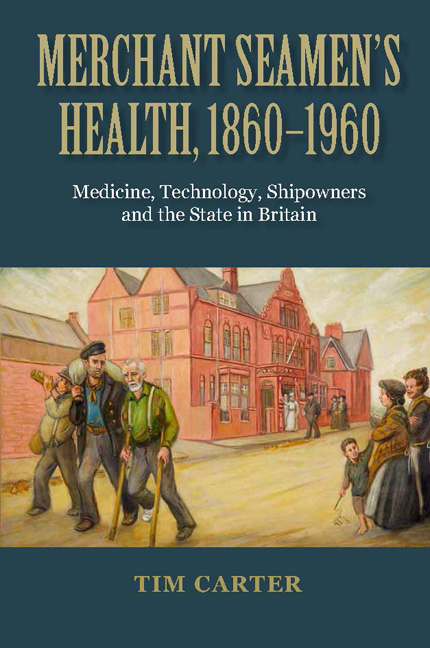Book contents
- Frontmatter
- Dedication
- Contents
- List of Illustrations
- Preface
- Acknowledgements
- List of Abbreviations
- Glossary of nautical terms used
- Introduction
- 1 Health at sea before 1860
- 2 Unseaworthy seamen
- 3 The health of merchant seamen in the nineteenth century
- 4 Injury and disease at sea in the nineteenth century
- 5 The seaman ashore: victim, threat or patient?
- 6 Bad food and donkey's breakfasts
- 7 Fit for lookout duties
- 8 The long-term health of seamen
- 9 War, manpower and fitness for service
- 10 Seamen's health in the welfare state
- 11 Retrospect and prospect
- Bibliography
- Index
6 - Bad food and donkey's breakfasts
Published online by Cambridge University Press: 05 November 2014
- Frontmatter
- Dedication
- Contents
- List of Illustrations
- Preface
- Acknowledgements
- List of Abbreviations
- Glossary of nautical terms used
- Introduction
- 1 Health at sea before 1860
- 2 Unseaworthy seamen
- 3 The health of merchant seamen in the nineteenth century
- 4 Injury and disease at sea in the nineteenth century
- 5 The seaman ashore: victim, threat or patient?
- 6 Bad food and donkey's breakfasts
- 7 Fit for lookout duties
- 8 The long-term health of seamen
- 9 War, manpower and fitness for service
- 10 Seamen's health in the welfare state
- 11 Retrospect and prospect
- Bibliography
- Index
Summary
A changing industry
Concerns about the health of seamen have a long history, as described already. The main focus appears to have been on ratings rather than officers, although this differentiation is only rarely made. The poor state of health of seamen was seen as a threat to safe navigation; as a potential cost to shipowners, or failing that to the state, for treatment and repatriation; as a threat to the public health from importation and transmission of infections; and as an affront to public morality from drunken and debauched behaviour.
Regulatory measures were put in place that aimed to minimise some of these threats by means of administrative arrangements such as the 1867 Merchant Shipping Act and the port health clauses of the 1873–5 Public Health Acts. These threats were perceived, in part, to be a consequence of the world-wide mobility of seamen, but a large share of the blame was placed on the lifestyle and behaviour of seamen themselves and those who profited by encouraging what was seen as a dissolute and debauched way of life. The aspirations and voices of the seamen themselves were faint, while those of the shipowners and mission workers were strong and had a political impact. However the seaman's voice and their attitudes to the shortcomings of the law can be found in the verses of the song ‘The Merchant Shipping Act’.
- Type
- Chapter
- Information
- Merchant Seamen's Health, 1860–1960Medicine, Technology, Shipowners and the State in Britain, pp. 85 - 100Publisher: Boydell & BrewerPrint publication year: 2014



